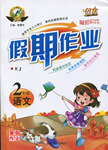题目内容
Henry was away from home for quite a bit and _______ saw his family.
A. frequently B. seldom C. always D. usually
B
【解析】
试题分析:考查副词词义辨析。句意:Henry离开家很长时间了并且很少回来看家人。根据句意因为离开很长时间了,所以,他应该很少回家。根据句意选B。 Frequently频繁地;always 总是;usually通常。
考点:考查副词词义辨析。

练习册系列答案
 鸿图图书寒假作业假期作业吉林大学出版社系列答案
鸿图图书寒假作业假期作业吉林大学出版社系列答案
相关题目